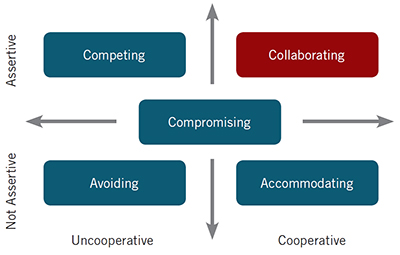Conflict Management Homework Help
Conflict Management
The point of Conflict Management is fundamental to individual and expert advancement.
As a matter of first importance, it instructs us that we don't have to escape from a contention because of the dread of either being overwhelmed or being excessively overbearing. Clashes are perhaps the most advantageous part of correspondence. When we face conclusions other than our own, we either gain from it, or show others something new. The best is when both occurs.

Conflict management includes actualizing procedures to restrain the negative parts of contention and to expand the positive parts of contention at a level equivalent to or higher than where the contention is occurring. Moreover, the point of peace promotion is to upgrade learning and gathering results (adequacy or execution in hierarchical setting) (Rahim, 2002, p. 208). It isn't worried about taking out all contention or keeping away from struggle. Strife can be profitable to gatherings and associations. It has been appeared to build bunch results when overseen appropriately (for example Alper, Tjosvold, and Law, 2000; Bodtker and Jameson, 2001; Rahim and Bonoma, 1979; Khun and Poole, 2000; DeChurch and Marks, 2001).
Second, considering peace promotion instructs us that varying conclusions regarding a matter can prompt a superior comprehension of both the subject and the people included.
Third, when we leave a contention, regardless of whether we have all gone to an understanding or not, we have made an endeavor to determine the issue. Most issues, in all part of our lives, are left uncertain basically on the grounds that we envision what the other may think about our assessment, more regrettable yet, that they probably won't consider anything it. These sentiments and feelings just hinder pushing ahead.
Presently, with regards to examining the subject and why we should. It is straightforward. A methodological way to deal with overseeing clashes or realizing that specific rules will help settle contradictions, is in every case more advantageous than an erratic methodology. Hereditarily we are not too unique, yet mentally the contrast among us and the individual beside us is as wide as space itself. Better to have a manual for light the way, instead of running into correspondence detours. There are five styles of conflict management, summarized as follows.
(1) Accommodating
This approach is based more on cooperation and less on assertiveness. The conflict negotiator places her own interest after the interest of the other party.
(2) Avoidance
The conflict negotiator does not want to confront the conflict or communicate about the conflict, and therefore chooses not to participate in the conflict resolution process at all.
(3) Collaborating
Both parties to the conflict willingly cooperate and work in order to come toward a mutually satisfactory resolution. This equally emphasizes assertiveness and cooperation.
(4) Compromising
In this approach, both parties to the conflict compromise on one or more aspects of their conflict resolution interests. In this style, each party gains something and lose something.
(5) Confrontation
This approach places more emphasis on assertiveness than on cooperation, and each pary sticks to a win-win solution acceptability only. In many cases, a confrontation style does not lead to a mutually acceptable resolution.
Project Management Tutorials
- Activity Based Costing
- Basic Quality Tools
- Benchmarking Process
- Cause and Effect Diagram
- Project Activity Diagram
- Project Charter
- Project Contract Types
- Project Cost Control
- Gantt Chart Tool
- PERT Estimation Technique
- Work Breakdown Structure
- Motivational Theories
- Project Kick-off Meeting
- Conflict Management
- Crisis Management
- Critical Chain Project Management
- Decision Making Process
- Monte Carlo Analysis
- Negotiation Skills
- Pareto Chart Tool
- Project Management Processes
- Project Manager Goals
- Project Portfolio Management
- Project Quality Plan
- Project Scope
- Project Management Software
- Project Time Management
- Capability Maturity Model (CMM)
- Critical Chain Project Management (CCPM)
- Critical Path Method (CPM)
- Earned Value Management (EVM)
- Enterprise modeling
- Event chain diagram
- Five Forces Analysis
- Graphical Evaluation and Review Technique (GERT)
- Inclusive Management
- Product Life Cycle
- Run chart
- Six Sigma
- Aggregate planning
- Budgeted Cost of Work Performed
- Business analysis
- Business Process Modeling (BPM)
- Event Chain Diagrams
- Gantt chart
- Henry Gantt
Project Management Case studies
- Project Management Methodologies
- Implementation of Project Management
- Project Management Cultures
- Project Management Organizational Structures
- Negotiating for resources In Project Management
- Project Management Estimating
- Project Management Planning
- Project Scheduling
- Project Execution
- Controlling Projects Case Study
- Project Risk Management
- Conflict management Case Study
- Morality and Ethics Case Study
- Managing Scope Changes Case Study
- Wage and Salary Administration
- Time Management Case Study
- Industry Specific Construction Case Study
Project Management Sample Assignments
Project Management Sample Solutions
Testimonials
Very affordable projects!! And that to submit before deadlines. Thanks for helping me in my database project and raising my grades. I have been able to secure good marks in my internal assessment only because of you. Read More

